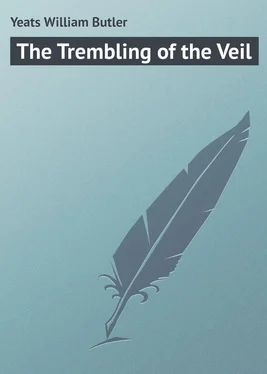William Yeats - The Trembling of the Veil
Здесь есть возможность читать онлайн «William Yeats - The Trembling of the Veil» — ознакомительный отрывок электронной книги совершенно бесплатно, а после прочтения отрывка купить полную версию. В некоторых случаях можно слушать аудио, скачать через торрент в формате fb2 и присутствует краткое содержание. Жанр: foreign_prose, на английском языке. Описание произведения, (предисловие) а так же отзывы посетителей доступны на портале библиотеки ЛибКат.
- Название:The Trembling of the Veil
- Автор:
- Жанр:
- Год:неизвестен
- ISBN:нет данных
- Рейтинг книги:5 / 5. Голосов: 1
-
Избранное:Добавить в избранное
- Отзывы:
-
Ваша оценка:
- 100
- 1
- 2
- 3
- 4
- 5
The Trembling of the Veil: краткое содержание, описание и аннотация
Предлагаем к чтению аннотацию, описание, краткое содержание или предисловие (зависит от того, что написал сам автор книги «The Trembling of the Veil»). Если вы не нашли необходимую информацию о книге — напишите в комментариях, мы постараемся отыскать её.
The Trembling of the Veil — читать онлайн ознакомительный отрывок
Ниже представлен текст книги, разбитый по страницам. Система сохранения места последней прочитанной страницы, позволяет с удобством читать онлайн бесплатно книгу «The Trembling of the Veil», без необходимости каждый раз заново искать на чём Вы остановились. Поставьте закладку, и сможете в любой момент перейти на страницу, на которой закончили чтение.
Интервал:
Закладка:
In London I saw nothing good and constantly remembered that Ruskin had said to some friend of my father’s – “As I go to my work at the British Museum I see the faces of the people become daily more corrupt.” I convinced myself for a time, that on the same journey I saw but what he saw. Certain old women’s faces filled me with horror, faces that are no longer there, or if they are pass before me unnoticed: the fat blotched faces, rising above double chins, of women who have drunk too much beer and eaten much meat. In Dublin I had often seen old women walking with erect heads and gaunt bodies, talking to themselves with loud voices, mad with drink and poverty, but they were different, they belonged to romance. Da Vinci had drawn women who looked so and so carried their bodies.
XVI
I attempted to restore one old friend of my father’s to the practice of his youth, but failed, though he, unlike my father, had not changed his belief. My father brought me to dine with Jack Nettleship at Wigmore Street, once inventor of imaginative designs and now a painter of melodramatic lions. At dinner I had talked a great deal – too much, I imagine, for so young a man, or maybe for any man – and on the way home my father, who had been plainly anxious that I should make a good impression, was very angry. He said I had talked for effect and that talking for effect was precisely what one must never do; he had always hated rhetoric and emphasis and had made me hate it; and his anger plunged me into great dejection. I called at Nettleship’s studio the next day to apologise, and Nettleship opened the door himself and received me with enthusiasm. He had explained to some woman guest that I would probably talk well, being an Irishman, but the reality had surpassed, etc., etc. I was not flattered, though relieved at not having to apologise, for I soon discovered that what he really admired was my volubility, for he himself was very silent. He seemed about sixty, had a bald head, a grey beard, and a nose, as one of my father’s friends used to say, like an opera-glass, and sipped cocoa all the afternoon and evening from an enormous tea-cup that must have been designed for him alone, not caring how cold the cocoa grew. Years before he had been thrown from his horse, while hunting, and broke his arm, and because it had been badly set suffered great pain for a long time. A little whisky would always stop the pain, and soon a little became a great deal and he found himself a drunkard, but having signed his liberty away for certain months he was completely cured. He had acquired, however, the need of some liquid which he could sip constantly. I brought him an admiration settled in early boyhood, for my father had always said, “George Wilson was our born painter, but Nettleship our genius,” and even had he shown me nothing I could care for, I had admired him still because my admiration was in my bones. He showed me his early designs, and they, though often badly drawn, fulfilled my hopes. Something of Blake they certainly did show, but had in place of Blake’s joyous, intellectual energy a Saturnian passion and melancholy. “God Creating Evil,” the death-like head with a woman and a tiger coming from the forehead, which Rossetti – or was it Browning? – had described “as the most sublime design of ancient or modern art,” had been lost, but there was another version of the same thought, and other designs never published or exhibited. They rise before me even now in meditation, especially a blind Titan-like ghost floating with groping hands above the tree-tops. I wrote a criticism, and arranged for reproductions with the editor of an art magazine, but after it was written and accepted the proprietor, lifting what I considered an obsequious caw in the Huxley, Tyndall, Carolus Duran, Bastien-Lepage rookery, insisted upon its rejection. Nettleship did not mind its rejection, saying, “Who cares for such things now? Not ten people,” but he did mind my refusal to show him what I had written. Though what I had written was all eulogy, I dreaded his judgment for it was my first art criticism. I hated his big lion pictures, where he attempted an art too much concerned with the sense of touch, with the softness or roughness, the minutely observed irregularity of surfaces, for his genius; and I think he knew it. “Rossetti used to call my pictures pot-boilers,” he said, “but they are all – all” – and he waved his arm to the canvasses – “symbols.” When I wanted him to design gods, and angels, and lost spirits once more, he always came back to the point “Nobody would be pleased.” “Everybody should have a raison d’être ” was one of his phrases. “Mrs – ’s articles are not good but they are her raison d’être .” I had but little knowledge of art for there was little scholarship in the Dublin art school, so I overrated the quality of anything that could be connected with my general beliefs about the world. If I had been able to give angelical or diabolical names to his lions I might have liked them also and I think that Nettleship himself would have liked them better and liking them better have become a better painter. We had the same kind of religious feeling, but I could give a crude philosophical expression to mine while he could only express his in action or with brush and pencil. He often told me of certain ascetic ambitions, very much like my own, for he had kept all the moral ambition of youth, as for instance – “Yeats, the other night I was arrested by a policeman – was walking round Regent’s Park barefooted to keep the flesh under – good sort of thing to do. I was carrying my boots in my hand and he thought I was a burglar and even when I explained and gave him half a crown, he would not let me go till I had promised to put on my boots before I met the next policeman.”
He was very proud and shy and I could not imagine anybody asking him questions and so I was content to take these stories as they came: confirmations of what I had heard of him in boyhood. One story in particular had stirred my imagination for, ashamed all my boyhood of my lack of physical courage, I admired what was beyond my imitation. He thought that any weakness, even a weakness of body, had the character of sin and while at breakfast with his brother, with whom he shared a room on the third floor of a corner house, he said that his nerves were out of order. Presently he left the table, and got out through the window and on to a stone ledge that ran along the wall under the windowsills. He sidled along the ledge, and turning the corner with it, got in at a different window and returned to the table. “My nerves,” he said, “are better than I thought.”
Nettleship said to me: “Has Edwin Ellis ever said anything about the effect of drink upon my genius?” “No,” I answered. “I ask,” he said, “because I have always thought that Ellis has some strange medical insight.” Though I had answered no, Ellis had only a few days before used these words: “Nettleship drank his genius away.” Ellis, but lately returned from Perugia where he had lived many years, was another old friend of my father’s but some years younger than Nettleship or my father. Nettleship had found his simplifying image, but in his painting had turned away from it, while Ellis, the son of Alexander Ellis, a once famous man of science, who was perhaps the last man in England to run the circle of the sciences without superficiality, had never found that image at all. He was a painter and poet, but his painting, which did not interest me, showed no influence but that of Leighton. He had started perhaps a couple of years too late for Pre-Raphaelite influence, for no great Pre-Raphaelite picture was painted after 1870, and left England too soon for that of the French painters. He was, however, sometimes moving as a poet and still more often an astonishment. I have known him cast something just said into a dozen lines of musical verse, without apparently ceasing to talk; but the work once done he could not or would not amend it, and my father thought he lacked all ambition. Yet he had at times nobility of rhythm – an instinct for grandeur, and after thirty years I still repeat to myself his address to Mother Earth —
Читать дальшеИнтервал:
Закладка:
Похожие книги на «The Trembling of the Veil»
Представляем Вашему вниманию похожие книги на «The Trembling of the Veil» списком для выбора. Мы отобрали схожую по названию и смыслу литературу в надежде предоставить читателям больше вариантов отыскать новые, интересные, ещё непрочитанные произведения.
Обсуждение, отзывы о книге «The Trembling of the Veil» и просто собственные мнения читателей. Оставьте ваши комментарии, напишите, что Вы думаете о произведении, его смысле или главных героях. Укажите что конкретно понравилось, а что нет, и почему Вы так считаете.












